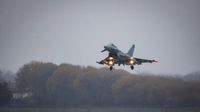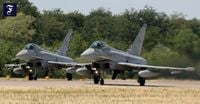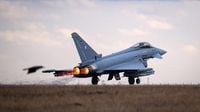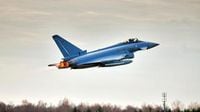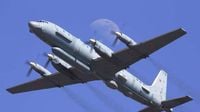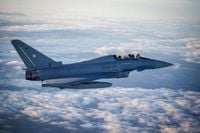On March 27, 2025, tensions in the Baltic Sea escalated as the German Air Force successfully intercepted a Russian reconnaissance aircraft, an Ilyushin IL-20M, east of the island of Rügen. The aircraft was operating without a flight plan and lacked a transponder signal, failing to respond to multiple radio calls from air traffic control. This incident highlights ongoing concerns regarding Russian military activities near NATO airspace.
The German Eurofighters, part of the Quick Reaction Alert (QRA) stationed at Fliegerhorst Laage in Mecklenburg-Vorpommern, were scrambled shortly after an alarm was triggered at 9:12 AM. Reports indicate that activity was detected in the Kaliningrad area, prompting the swift response from the Luftwaffe. The Eurofighters escorted the Russian aircraft until it exited the NATO-adjacent airspace, turning back towards Kaliningrad.
According to the Luftwaffe, such encounters with Russian military aircraft are not uncommon. Instances of Russian planes approaching NATO airspace, often without active communication, have been reported frequently. The Luftwaffe confirmed that the Ilyushin IL-20M is specifically designed for electronic and telecommunications reconnaissance, a role it has fulfilled since its introduction during the Cold War, where it was known by the NATO codename "Coot-A".
"Our QRA was deployed today! An unknown aircraft without a flight plan and transponder was sighted over the Baltic Sea. Our Eurofighters identified a Russian IL-20 and safely escorted it," the Luftwaffe stated on their social media platform, emphasizing their commitment to airspace security.
The incident comes against the backdrop of increasing military tensions in the region following Russia's invasion of Ukraine in 2022. The Baltic Sea has become a focal point for NATO's defense strategies, leading to enhanced military presence and readiness among member states. In October 2024, German Defense Minister Boris Pistorius inaugurated a new maritime tactical headquarters in Rostock, aimed at monitoring the Baltic region and coordinating naval activities.
"The security of the Baltic Sea is challenged nearly daily by Russia," Pistorius remarked during the headquarters' inauguration, highlighting the strategic importance of the area amid ongoing geopolitical tensions.
As the situation continues to evolve, NATO's air defense systems, including Germany's QRA, remain vigilant. The QRA is responsible for ensuring the safety of European airspace, and it routinely engages in intercepting unidentified aircraft that may pose a threat.
In a similar incident in November 2024, two German fighter jets were also tasked with escorting a Russian reconnaissance aircraft that was operating without a flight plan or transponder. Such recurring events underline the persistent risks associated with military flights in close proximity to NATO borders.
In light of these developments, the German Air Force is reinforcing its operational protocols to ensure swift responses to potential violations of airspace. The presence of Russian military aircraft in the vicinity not only raises alarms for national security but also poses significant risks to civilian air traffic.
As NATO continues to monitor these activities, the alliance's commitment to collective defense remains steadfast. The ongoing military exercises and heightened alert status reflect a unified approach to safeguarding the region against potential threats.
In summary, the interception of the Russian IL-20M by German Eurofighters underscores the delicate balance of power in the Baltic Sea, where military readiness is paramount. The Luftwaffe's rapid response illustrates the importance of vigilance in maintaining airspace security amidst rising tensions.
